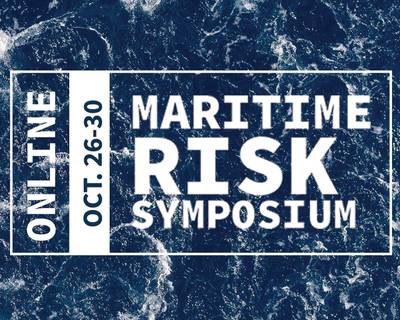
In 2007, scholar Nassim Nicholas Taleb, who holds a doctorate from the University of Paris, wrote a bestselling book titled “Black Swan,” which proposed a theory involving unpredictable events with significant impact. Taleb believed that a black swan event was an outlier with significant impact and, once it occurs, is the source of deep reflection and rationalization.
Since the book’s publication, a significant number of research efforts have been developed to consider possible black swan events that significantly impact the Maritime Transportation System (MTS) and the Maritime Global Commons. In April 2020, Marine Money held a webinar series on navigating risk in a “Bevy of Black Swans.” Award-winning journalist Terry Macalister wrote about maritime black swans in May 2020 in TradeWinds, a global shipping news source. A May 2020 article in Physics World provided a framework for learning from black swans.
The global onset of COVID-19 and its impact on the MTS has further heightened a strong need for a rigorous discussion of maritime resilience and black swan events. It has reinforced the fact that the nation’s ability to trade internationally depends on the collective maritime infrastructure of ships, ports, the industries that use them or support their use, and the government agencies responsible for their safe, continuous operation. What is at stake is staggering.

MRS 2020 Registration
https://ciri.illinois.edu/events/11th-maritime-risk-symposium-2020
According to the Maritime Administration, there are 25,000 miles of navigable channels and 3,500 marine terminals. According to a 2018 report to Congress titled “An Assessment of the U.S. Marine Transportation System,” the U.S. marine transportation system annually:
- Moves more than 2 billion tons of domestic and international freight
- Imports 3.3 billion barrels of oil to meet U.S. energy demands
- Transports 134 million passengers by ferry
- Serves 78 million Americans engaged in recreational boating
- Hosts more than 5 million cruise ship passengers
- Supports 110,000 commercial fishing vessels and recreational fishing that contribute $111 billion to state economies.
The risks to maritime infrastructure, along with associated threats, vulnerabilities and consequences, have many facets. That is why, for over a decade, the Maritime Risk Symposium (MRS) has met annually, bringing together domain experts from the maritime industry, U.S. Coast Guard leadership and researchers from industry, think tanks, government, international stakeholders and academia. An invitation only event, MRS is structured each year around a theme using keynote addresses, invited talks and panel presentations to talk about emerging risks, identify gaps where research is needed, and share experiences with mitigating the risk of particular interest that year. Themes have been diverse, including:
- (2016) Risk in the Western Hemisphere and Southern Border Approaches
- (2017) Coastal Resilience, Cyber-security and Maritime Risk
- (2018) Energy and Maritime Risk
- (2019) Understanding and Managing Risks in the Maritime Transportation System
The U.S. Coast Guard partners with many organizations in addressing pressing maritime issues, and each year one of these partners hosts MRS. Each MRS has crafted a discussion of a vital aspect of risk and risk understanding within the MTS. Proceedings from these events have shaped research in many forms.
In October 2020, MRS will be hosted by the DHS-funded Critical Infrastructure Resilience Institute (CIRI) at the University of Illinois at Urbana-Champaign (UIUC). CIRI’s selection as host was made in 2018; owing to CIRI’s mission, a theme of Resilience in the Maritime Transportation System was selected early in the planning process. We developed the notion of looking at different attributes of resilience (e.g., robustness, adaptability, recovery) in difference segments of maritime organizations, and began the planning process.
The theme took on new meaning as the COVID-19 pandemic grew this spring, which also led to the symposium becoming a virtual event. MRS 2020 leadership saw a unique opportunity to shape MRS 2020 to enable reflection and thought on the general issue of maritime resilience in so-called black swan events, using the experience of COVID-19 as a driver for thinking about maritime resilience for future black swan events, not just the pandemic.
The MRS 2020 planning committee embraced this notion, and the program of MRS 2020 has taken shape. MRS 2020 has developed panels of experts to discuss resilience in infrastructure, the human element, the supply chain, cyber-security, inland waterways, lessons from recent disasters and energy … all through the lens of black swan events. The virtually offered program will be held Oct. 26-30, with around four hours of keynotes, panels and student poster presentations each day. In addition, MRS 2020 will also host a USCG Strategic Evergreen analysis event Oct. 29-30, leveraging the unique perspectives of those attending MRS. The Evergreen Program is the Coast Guard’s Strategic Foresight Initiative, tasked with looking over the horizon to inform current planning and better prepare the Coast Guard for an uncertain and unpredictable future.
Finally, this year’s event will also feature expanded engagement for students. The annual poster contest is open to undergraduate, graduate and doctoral students. In addition, arrangements are being made for students to engage with some of the key participants in virtual Q&A sessions, offering access usually not available in international events like this.
For more information on the 2020 MRS agenda and student poster contests:
https://ciri.illinois.edu/events/11th-maritime-risk-symposium-2020
MRS 2020 Registration
https://ciri.illinois.edu/events/11th-maritime-risk-symposium-2020
About the Authors: Dr. David Nicol is the director of the Department of Homeland Security Center of Excellence at the University of Illinois – Critical Infrastructure Resilience Institute (CIRI) and a Franklin W. Woeltge Professor of Electrical and Computer Engineering. He is internationally recognized for his work in security policy and analysis. Dr. Joe DiRenzo is the director of research partnerships at the U.S. Coast Guard Research and Development Center. A retired Coast Guard officer, DiRenzo teaches for American Military University and Northcentral University. He is the former Coast Guard chair at the Joint Forces Staff College.
 Dr. Joe DiRenzo
Dr. Joe DiRenzo
 Dr. David Nicol
Dr. David Nicol














